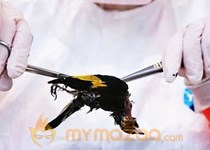Top US scientists on Wednesday defended their bid to stop details of a mutant bird flu virus from being published and called for global cooperation to ward off an uncontrollable pandemic.
Meanwhile, scientists involved in the experiments said they are cooperating with government officials and the editors of the journals Science and Nature to pare down their research for publication in the coming weeks.
The controversy arose when two separate research teams -- one in the Netherlands and the other in the United States -- separately found ways to alter the H5N1 avian influenza so it could pass easily between mammals.
Until now, bird flu has been rare in humans, but particularly fatal in those who do get sick. H5N1 first infected humans in 1997 and has killed more than one in every two people that it infected, for a total of 350 deaths.
The recommendations from a non-governmental advisory panel that key details of the newly altered virus be withheld drew fire from some scientists who saw it as censorship of material that is essential for surveillance and the hunt for vaccines.
Some experts have pointed out that the data does not show whether the engineered virus is actually transmissible between humans, and a major risk is that the virus would emerge on its own in nature.
But the chair of the National Science Advisory Board for Biosecurity, Paul Keim, told AFP that even though the research has already been discussed by Dutch scientists at public forums, all 23 members voted unanimously to urge editors to withhold the data in case it fell into the wrong hands.










